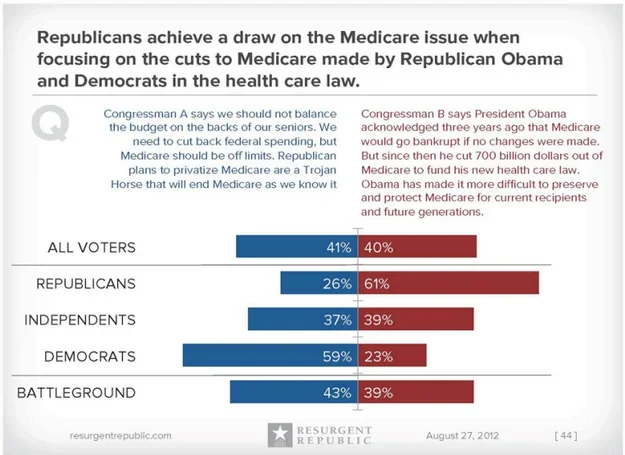Republicans say yes. Steven Benen agrees. I think that conclusion is premature. The Democrats and Obama retain key advantages on this issue—that is, this particular fight is not yet a draw. The Republicans continue to fight an uphill battle. Here is why.
1) Do people know what Ryan’s Medicare plan is?
Most do not. In an August 18-20 YouGov poll, respondents were asked this question:
Republican vice presidential candidate Paul Ryan has proposed a plan to change Medicare, the federal government’s health insurance program for older Americans. Which of the following most accurately describes Ryan’s proposal for Medicare? – Gradually end the Medicare program over the next 40 years – Turn Medicare into a government voucher program for the purchase of private insurance – Transfer control of the Medicare program from the federal government to the states – Have not heard about Ryan’s plan
In this sample, 40% picked the correct answer (voucher program). The largest group (43%) said that they had not heard. Democrats were most likely to pick the correct answer (45% did), followed by Republicans (38%) and pure independents (36%). The majority of pure independents (58%) had not heard of the plan.
2) Among those who do know Ryan’s plan, is it popular?
Among those who picked voucher program, 58% oppose it and 34% favor it. The intensity of opinion favors opponents: 53% strongly oppose it. Naturally, Democrats are more likely than Republicans to oppose it, and Democrats’ opinions are more intense. Among independents, 60% oppose it (with the caveat that this figure is based on a small sample—only 60 independents). This NY Times poll and this Kaiser/Washington Post poll also found opposition to Ryan’s plan.
3) Which party does the public trust to handle Medicare?
As I noted in my first post on this subject, Democrats traditionally have an advantage on Medicare. The August YouGov poll confirmed this. About 34% of the sample trusted Democrats while 27% trusted Republicans (the remainder said both or neither party). I can put this in the context of other issues. The Republicans have a small advantage (2 points) on the economy and a larger advantage (7 points) on the budget deficit. The Democrats have a small advantage on foreign policy (2 points) and a larger advantage (8 points) on Social Security.
Most importantly, the Democratic advantage on this hasn’t moved much in the last year—despite the recent campaigning. My first post cited a couple earlier polls that produced results consistent with this YouGov poll.
4) Which candidate does the public trust to handle Medicare?
Consider the gap not between the Democratic and Republican parties, but between Obama and Romney. Here’s a list of findings from August polls that asked which candidate was better on Medicare:
CNN: Obama +5 (registered voters) and Obama +1 (likely voters)
Washington Post: Obama +1 (adults) and Romney +3 (registered voters)
AP/GfK: Obama +8 (adults) and +6 (registered voters)
Fox: Obama/Biden +7 (registered voters) and +3 (likely voters)
In addition, some battleground state polls give Obama an edge of +8 to +10 points among likely voters. (Seniors tend to trust Romney more than Obama. Of course, they also tend to support Romney over Obama, period. More below on how seniors do—or do not—respond to Medicare campaign messages.)
In fact, Obama’s advantage on this issue isn’t that much different than the Democratic party’s edge—at least among registered voters and adults. It is a bit smaller in the national polls of likely voters but not polls, but not the 3 state polls among likely voters.
5) Can the GOP talk successfully about this issue?
Have the Republicans found a successful frame for talking about a traditionally Democratic issue? In my earlier post, I noted that parties often “trespass” on the other party’s issues by framing that issue to fit their strengths. The GOP seeks to do that by tying Medicare to Obamacare, which is obviously far less popular than Medicare. Here is Jay Cost advocating that strategy. Here is an NRCC case study from a Nevada special election. Here is a slide with a poll question from Resurgent Republic, showing a Democratic argument and this Republican frame fighting to a draw:

The question, of course, is whether any survey question like this is an adequate test of campaign messages. It doesn’t capture all the claims in this Obama ad, for example. But I don’t meant to criticize Resurgent Republic. The bigger problem with message testing in any survey is this: it’s like testing someone’s reaction to a blizzard by holding an ice cube against their skin. A swirling blinding mess is distilled to a clear identifiable cue.
A lot of campaigning boils down to what I would call “frames vs. fundamentals.” When that is the case, bet on the fundamentals. The fundamentals here are these: Medicare is an issue that still favors the Democrats and Obama, and a majority of Americans oppose Ryan’s plan for Medicare—both when they are able to state what it is and also when it is described for them in a poll. This issue is not yet a “draw.” It’s still Democratic turf.
For framing to work, the GOP must get voters’ attention even as many tune out the campaign. The GOP must make its particular frame stand out amidst the blizzard. That is difficult. And even if the GOP can get voters’ attention, the frame has got to get some of them to change their opinions—also a difficult task, as much social science attests.
Ultimately, the Republicans also have to think about trade-offs. Given all of the possible issues they could discuss, is Medicare the best use of their time? Is it a better issue than the economy or the deficit? Where will they get the most bang for their buck?
To be sure, in the case of Medicare, the Obama campaign clearly has some work to do too, mainly because many people do not know what Ryan’s plan is. But the Romney campaign arguably has to do more.
6) Will any of this Medicare debate actually mobilize seniors to vote?
Let me end on a cautionary note. It is easy to imagine that campaign advertising about Medicare will send seniors streaming to the polls to defend Medicare from the vicious cuts of Paul Ryan or Barack Obama or whomever. But when Andrew Karch and I studied Medicare advertising and senior turnout in the 1998, 2000, and 2002 elections, this is what we found:
…we found no consistent evidence that messages related to Social Security and Medicare were associated with higher turnout among seniors
Which is to say, regardless of whether and how you think the parties should engage Medicare, it might not matter in the end.









